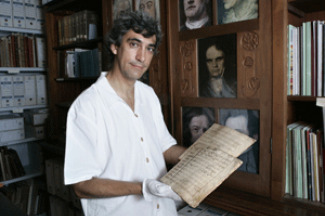Score found of Mozart's first opera performed in Spain

The research group Les músiques en les societats contemporànies-MUSC (Musics in Contemporary Society) of UAB determined and reconstructed the manuscript used in 1798 in the first representation of Così fan tutte performed in Barcelona. The team, directed by Dr Francesc Cortès and coordinated by Dr Joaquim Rabaseda, considers that the manuscript found was copied in Vienna and that the text and music must have been adapted, given that the copy seemed to be incomplete upon its arrival to Barcelona. The Barcelona version was the first representation of Mozart's opera in Spain.
In celebration of the name day of King Charles IV of Spain on 4 November 1798, the opera Così fan tutte by Wolfgang Amadeus Mozart was performed for the first time in Barcelona. Some fragments were eliminated and others adapted for the occasion, a fact which was well known since the end of the 19th century. Until now however it was thought that the adaptation simply responded to the likes of the city, an idea founded solely on the information contained in the opera booklet published in Barcelona. The musicological assessment carried out by the research group MUSC at the Library of Catalonia (BC) during the months of June and July has given researchers reason to believe that the adaptation was actually due to the score being incomplete when it arrived to Barcelona.
According to the study, the manuscript, which seemed to have been sent directly from Vienna, only contained three-fourths of the opera. Some of the central fascicles were missing and it was necessary to recreate the missing parts to make the opera piece logical and coherent. The text and tonality of some of the added scenes had to be modified and some of the choral fragments removed. The date of 4 October 1798 appears registered on the score, which indicates that the adaptation was done in a month, from the time the manuscript was received to the day it was performed.
Until now the opening act and a quintet of the Barcelona version was the only part of the opera to be known and was inventoried at the BC in 1960 and 1961. The work carried out by the research group MUSC under an agreement between BC and UAB has resulted in an in depth study of the full opera piece during the cataloguing process. Research results conclude that the manuscript formed part of scores originating most probably from the musical archives of the Santa Creu Theatre in Barcelona.
The representations of Così fan tutte in Barcelona were of the earliest performances of Mozart’s opera and therefore this version is an exceptional example of the first receptions of his work, years before he became a legend in the rest of Europe. Debuting at the end of January 1790 at the Vienna Burgtheater, Mozart's opera was later performed in Frankfurt, Prague, Leipzig, Dresden and Amsterdam. After his death, the opera debuted in Berlin in 1792 and in Augsburg in 1794. It was not until 1807 that the opera was performed at La Scala in Milano and in 1811 at Haymarket in London. Later references to a Mozart opera in Barcelona were found more than 50 years later, in 1849, when Don Giovanni was performed at Liceu.
The codicological study of the manuscript and the comparison with scores from Così fan tutte conserved in Vienna, London, Copenhagen, Karlsruhe, Dresden, Prague, Berlin, Hamburg, Frankfurt, Brno, Florence and Cambridge further point to the exceptionality of the opera's interpretation in Barcelona. Continuing with the research, MUSC will prepare a monograph dedicated to the Barcelona version of the opera which will be presented at the Universität Mozarteum Salzburg next summer. The book will be the first of a collection of scientific publications (in Catalan and English) by the research group.
Così fan tutte, together with Le nozze di Figaro (1786) and Don Giovanni (1787), is the last of a series of three operas Mozart composed with the collaboration of librettist Lorenzo da Ponte (1749-1838). The opera is based on the theme of "fiancée swapping" which at the time represented a critical view on new romantic sensibilities. Given its critical and ironic tone it was often criticised for its misogynist contents.
The research team which began the study of texts at the BC was directed by Dr Francesc Cortès, lecturer at Universitat Autònoma de Barcelona, and coordinated by Dr Joaquim Rabaseda, lecturer at the Higher School of Music of Catalonia (ESMUC). Participating in the study were research group members Anna Costal (UAB), Francesco Cotticelli (Università degli Studi di Napoli Federico II), Isabel Ferrer (UAB), Joan Gay (ESMUC) and Marisa Ruiz (UAB). Also collaborating in the research were Dr Josep Borràs, Dr Marc Heilbron, Dr Pau Monterde and Dr Josep Maria Vilà, as well as ESMUC grant holders Helena Bogunyà, José Reche and Laura Sintes.
References
Les músiques en les societats contemporànies, MUSC. Francesc Cortès & Joaquim Rabaseda.

